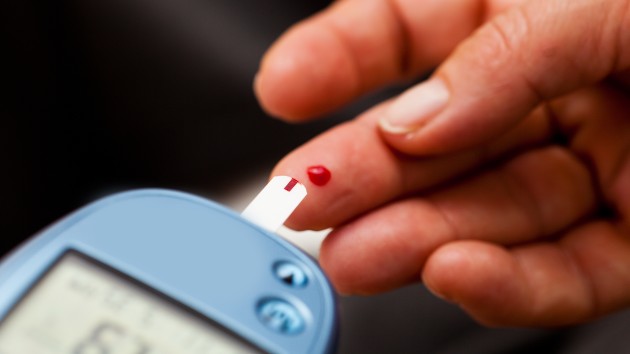(NEW YORK) — There is troubling news for those infected with the COVID-19 virus. New studies have found that the virus may cause diabetes in addition to pneumonia and other health problems.
Most people will recover from COVID without longer-term problems, but doctors have noticed that some patients go on to develop diabetes.
Now, new research is finding that the virus may infect and destroy certain cells that are crucial for keeping diabetes at bay. Armed with this new knowledge, scientists are now racing to understand how to best prevent this from happening in patients with COVID-19.
Diabetes already contributes to 10-15% of deaths in the United States. In 2017, nearly 34.2 million people, or 10.5% of the U.S. population, had diabetes. Per data from the Centers for Disease Control and Prevention, approximately 1.5 million Americans are diagnosed with diabetes every year. Of those with diabetes, nearly 1.6 million Americans have type 1 diabetes, an autoimmune disease that attacks pancreatic beta cells to reduce insulin production.
“There is a difference between type 1 and type 2 diabetes,” said Dr. Jennifer Ashton, ABC News’ chief medical correspondent and a board-certified OBGYN, who was not involved in the studies. “[In] type 1 diabetes, the body does not make enough insulin. In type 2, there is enough insulin but it is not working properly.”
As insulin causes cells to take up sugar in the blood, a decrease in insulin production or a resistance to insulin causes high levels of sugars or glucose in the blood. This high level of glucose, termed hyperglycemia, is the hallmark of diabetes.
“Earlier lab studies had suggested that [the COVID-19 virus] can infect human beta cells,” said Dr. Francis Collins, the director of the National Institutes of Health, said in a recent blog post. “They also showed that the dangerous virus can replicate in these insulin-producing beta cells to make more copies of itself and spread to other cells.”
New research from Stanford University School of Medicine and Weill Cornell Medicine confirmed the association between COVID-19 and diabetes. By analyzing autopsy samples from people who died of COVID-19, both studies illustrated the virus’ ability to infect pancreatic beta cells, decrease insulin secretion and effectively yield type 1 diabetes.
“The virus actually destroys the cells in the pancreas that make insulin,” said Ashton. “[This] decreases insulin levels and then leads directly to high sugar and type 1 diabetes.”
Experts say these particular cells may be especially vulnerable to being attacked by the virus as they contain certain receptors known to bind to COVID-19.
Once invaded, these cells were transformed into different types of cells with a lower expression of insulin. According to experts, this shows that SARS-CoV-2 could change the fate of a cell.
Encouragingly, one study showed that specific drugs might be able to reverse this fate. Those findings will need to be confirmed in larger, more rigorous studies, researchers say.
Unfortunately, the virus might damage the pancreas and cause diabetes in ways that aren’t as easily reversed with medication. Due to the destruction of pancreatic cells, patients could potentially become dependent on diabetes medications, such as insulin, long after they finish their battle with COVID-19.
“More study is needed to understand how SARS-CoV-2 reaches the pancreas and what role the immune system might play in the resulting damage,” said Collins.
Both works highlight the possibility of COVID-19-induced diabetes and stress the need for awareness in those infected with the virus.
“The key is if you are diagnosed with COVID-19 and have any classic signs or symptoms of type 1 diabetes, get tested for diabetes,” said Ashton.
Anyone who has recovered from COVID-19 should be on the lookout for symptoms of diabetes, Ashton added.
“We’re talking about extreme thirst and increase in urination, unintentional, significant weight loss, or fatigue, just to name a few,” she said.
Added Collins: “This work provides yet another reminder of the importance of protecting yourself, your family members, and your community from COVID-19 by getting vaccinated if you haven’t already — and encouraging your loved ones to do the same.”
Copyright © 2021, ABC Audio. All rights reserved.


